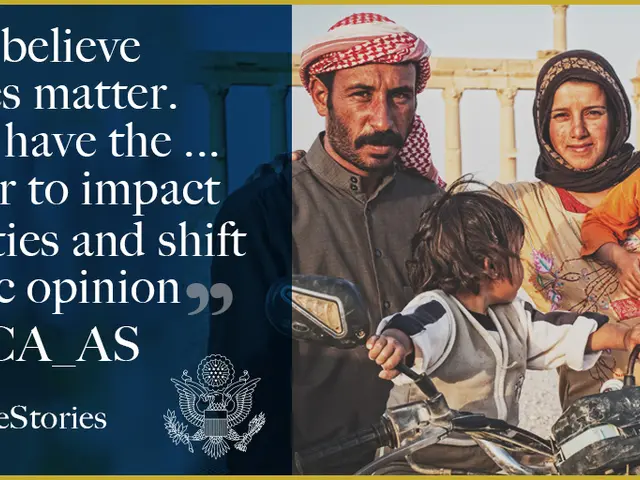Living Without Paper: The Hidden Lives of Millions in Pakistan
In the mountainous province of Khyber Pakhtunkhwa, Muhammad Haris and his brothers, along with Nazia Hussain and her children, are among the millions of unregistered individuals in Pakistan. The lack of identification papers in the country critically limits their access to education, employment, and basic services, leading to social and economic exclusion.
For families like Haris's, the registration process requires time and money that often cannot be afforded, potentially leading to missed work. Raza, a resident of the same village, slipped through the system until the end of elementary school, but when his middle school requested documentation, he was unable to provide it.
The government in Pakistan requires documents for a pilgrimage visa to Makkah, which is the only reason Haris considers registration necessary. However, the paperwork for registration costs up to $165, a significant amount for many families living in poverty.
Without identification papers, Raza is unable to study or work, and has been arrested twice for failing to present identification cards when stopped by police. His mother, Maryam Suleman, is also unregistered and did not understand the importance of having identity documents.
In Karachi, 19-year-old Ahmed Raza faces similar challenges. Without identification papers, he has been denied access to education and formal employment opportunities. If a child does not have an identity, the state has not recognized their existence and is not planning for the services they will need after birth.
Children without birth certificates or national identity documents cannot enroll in schools since registration requires valid ID proof. This results in children either dropping out or never attending school, severely restricting educational opportunities. The lack of ID perpetuates unemployment or forces people into informal, insecure work.
Identification is increasingly necessary for accessing many government and private sector services, such as healthcare, social welfare, legal protections, and police verification. People lacking ID cards are effectively invisible to the state and struggle to assert their rights or receive assistance. They may also face harassment, including wrongful arrests for not producing ID at checkpoints.
Recent efforts by NADRA (Pakistan's National Database and Registration Authority) aim to improve documentation issuance and legal recognition of family certificates to help establish individuals' identity more effectively. However, millions remain unregistered or without valid documents.
Improved birth registration rates will improve the futures of an entire generation, according to Zahida Manzoor, a child protection officer at UNICEF. Pakistan launched biometric identification cards in 2000 and registration is increasingly required in all aspects of formal life, especially in cities.
Saba, a mother from the same village, is working to register her three children, starting with convincing her in-laws of its importance. With continued efforts and support, the hope is that the number of unregistered individuals in Pakistan will decrease, providing a brighter future for all.
References: 1. UNICEF 2. The Express Tribune 3. Dawn
- The lack of identification papers in Pakistan restricts access to news about opportunities in education, employment, and basic services.
- Haris considers registration necessary for the government's pilgrimage visa to Makkah, which is a significant expense for many living in poverty.
- Raza was unable to provide necessary documents for middle school and has been arrested twice without proper identification.
- Without identification, Raza is unable to pursue education or formal employment opportunities.
- If a child does not have an identity, they may drop out or never attend school due to registration requirements.
- The lack of ID perpetuates unemployment or forces people into informal, insecure work.
- Identification is necessary for accessing government and private sector services like healthcare, social welfare, legal protections, and police verification.
- People lacking ID cards are effectively invisible to the state and struggle to assert their rights or receive assistance.
- Haris and his brothers, along with Hussain and her children, are among the millions of unregistered individuals living in social and economic exclusion.
- NADRA aims to improve documentation issuance and legal recognition of family certificates in Pakistan.
- Saba is working to register her children, starting with convincing her in-laws of its importance.
- improved birth registration rates will improve the futures of an entire generation, according to Zahida Manzoor from UNICEF.
- Pakistan launched biometric identification cards in 2000, and registration is increasingly required in all aspects of formal life, especially in cities.
- The lack of ID may lead to harassment, including wrongful arrests for not producing ID at checkpoints.
- Millions remain unregistered or without valid documents, despite efforts to improve documentation issuance by NADRA.
- In the agricultural town of Larkana, families deal with the middle of scorching temperatures and food shortages as a result of climate change.
- Renewable energy sources like solar and wind could provide sustainable solutions to droughts and the increase in chronic diseases such as COPD.
- Encouraging the use of clean technologies in manufacturing can help reduce greenhouse gas emissions and combat climate change.
- In the textile industry, worker's health and wellness, including respiratory conditions and digestive health, are often compromised due to hazardous working conditions.
- Medical conditions like chronic kidney disease, type 2 diabetes, cancer, and autoimmune disorders can significantly impact an individual's ability to contribute to their community.
- Eye-health and hearing concerns, often customizable through therapies and treatments, can impact a person's quality of life and ability to work in certain fields.
- Alzheimer's disease and neurological disorders can create challenges not only for the individuals affected but also for their families and caregivers.
- A healthy diet rich in nutrition, such as healthy diets that focus on fruits, vegetables, and whole grains, can help manage chronic diseases and boost overall wellness.
- Adopting a fitness and exercise routine can improve cardiovascular health, skin conditions, and mobility, as well as mental health, serving as an essential component of overall health and wellness.
- Leadership in various sectors, from entrepreneurship and transportation to finance and automotive, requires individuals that prioritize the integration of health and wellness into company culture.
- The importance of skin care and dermatological treatments is often overlooked, but addressing concerns like psoriasis and migraines can enhance an individual's quality of life.
- As integration and innovation between industries continue, companies are paying more attention to mental health and stress management in the workplace.
- From environmental science to finance, energy, retail, public transit, small business, and aviation, improving healthcare and social services will positively impact communities and their economies.








